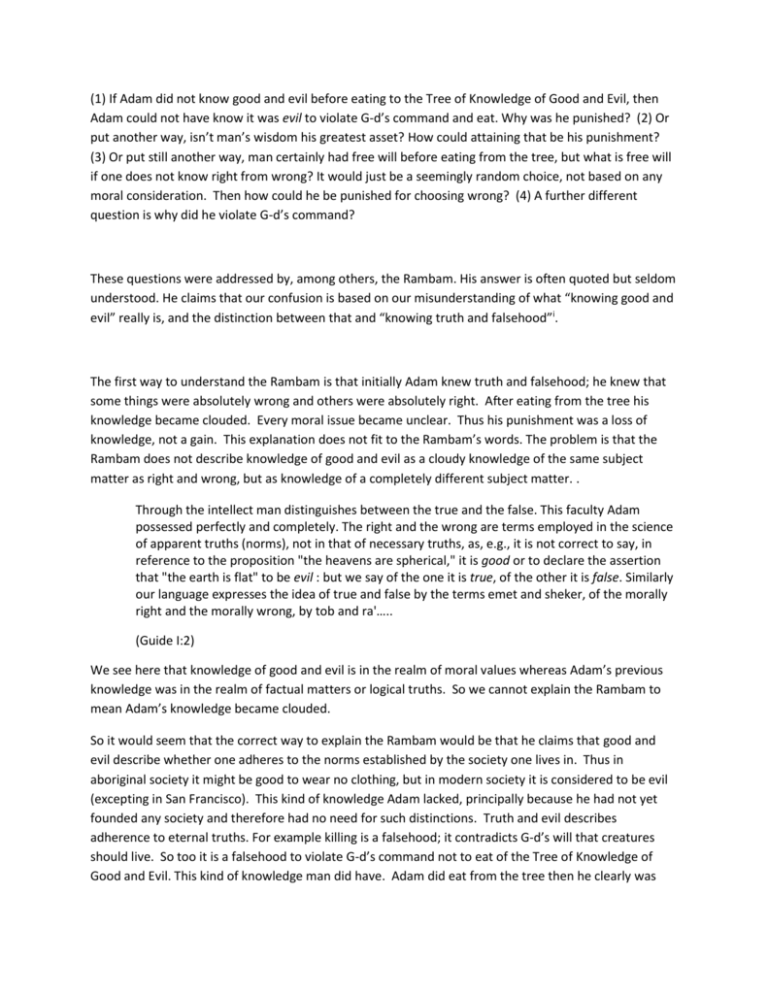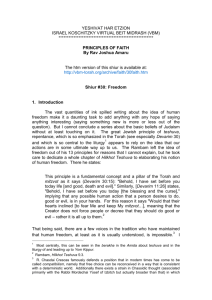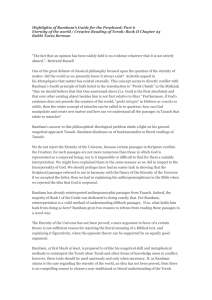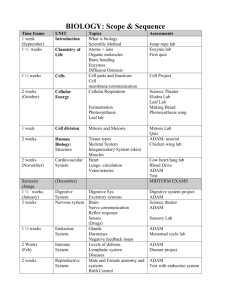Rambam on Adam HaRishon
advertisement

(1) If Adam did not know good and evil before eating to the Tree of Knowledge of Good and Evil, then Adam could not have know it was evil to violate G-d’s command and eat. Why was he punished? (2) Or put another way, isn’t man’s wisdom his greatest asset? How could attaining that be his punishment? (3) Or put still another way, man certainly had free will before eating from the tree, but what is free will if one does not know right from wrong? It would just be a seemingly random choice, not based on any moral consideration. Then how could he be punished for choosing wrong? (4) A further different question is why did he violate G-d’s command? These questions were addressed by, among others, the Rambam. His answer is often quoted but seldom understood. He claims that our confusion is based on our misunderstanding of what “knowing good and evil” really is, and the distinction between that and “knowing truth and falsehood”i. The first way to understand the Rambam is that initially Adam knew truth and falsehood; he knew that some things were absolutely wrong and others were absolutely right. After eating from the tree his knowledge became clouded. Every moral issue became unclear. Thus his punishment was a loss of knowledge, not a gain. This explanation does not fit to the Rambam’s words. The problem is that the Rambam does not describe knowledge of good and evil as a cloudy knowledge of the same subject matter as right and wrong, but as knowledge of a completely different subject matter. . Through the intellect man distinguishes between the true and the false. This faculty Adam possessed perfectly and completely. The right and the wrong are terms employed in the science of apparent truths (norms), not in that of necessary truths, as, e.g., it is not correct to say, in reference to the proposition "the heavens are spherical," it is good or to declare the assertion that "the earth is flat" to be evil : but we say of the one it is true, of the other it is false. Similarly our language expresses the idea of true and false by the terms emet and sheker, of the morally right and the morally wrong, by tob and ra'….. (Guide I:2) We see here that knowledge of good and evil is in the realm of moral values whereas Adam’s previous knowledge was in the realm of factual matters or logical truths. So we cannot explain the Rambam to mean Adam’s knowledge became clouded. So it would seem that the correct way to explain the Rambam would be that he claims that good and evil describe whether one adheres to the norms established by the society one lives in. Thus in aboriginal society it might be good to wear no clothing, but in modern society it is considered to be evil (excepting in San Francisco). This kind of knowledge Adam lacked, principally because he had not yet founded any society and therefore had no need for such distinctions. Truth and evil describes adherence to eternal truths. For example killing is a falsehood; it contradicts G-d’s will that creatures should live. So too it is a falsehood to violate G-d’s command not to eat of the Tree of Knowledge of Good and Evil. This kind of knowledge man did have. Adam did eat from the tree then he clearly was capable of acting “untruthfully”. But this action was not “evil” since it violated an absolute law of G-d not a man-made norm. The problem with this understanding of the Rambam is that it stretches the meaning of the word truth. Truth is more correctly applied to logical consistency with preestablished axioms or statements of fact. Two and two is four. The sun rose today. Or, as in the Rambam’s example, that the heavens are spherical is a truth. These are true statements. How can an action be true? Contradicting G-d’s will seems to be “evil”, not “false”. So too, violating a societal norm is evil, not false. Rambam is not merely redefining words in some game. He uses truth to mean logical truth, not adherence to natural or Divine moral right. Furthermore, why would gaining knowledge of moral truths inhibit ones knowledge of absolute truths? And this explanation does not explain why Adam violated G-d’s will. The third way to understand the Rambam is that Adam eating from the tree could actually be described as wrong, not untruthful, since it violated a law. Only statements of fact can be truthful. But the question is not at all whether eating from the tree was wrong or instead untruthful. Rambam is not discussing the character of the act of eating, but is discussing the difference in Adam’s state before and after the eatingii. Rambam is justifying that Adam’s state after eating was a lower state even though it is described as a state of knowledge. Rambam denigrates that later knowledge to put the lie to any claim that because of the sin Adam was rewarded, which was the original question and he is not discussing whether that act was wrong at all. Rambam’s claim is this: Adam knowing “truth and falsehood” before eating of the “Tree of Knowledge of Good and Evil” means that Adam contemplated the eternal Truths: natural sciences, mathematics and especially the nature of G-d. The Rambam makes explicit the equality between emet (truth) and G-d. At the start of the Mishna Torah (Y. H. 1:4) he writes: “G-d alone is truth. No other thing is True as He is.” Thus contemplating emet is a code word for contemplating G-d. After eating from the Tree, Adam changed the subject of his contemplation to those laws needed in running a state whether they be natural law or practical law. After his eating from the Tree, as Rambam writes, …he was wholly absorbed in the study of what is proper and what improper. Then he fully understood the magnitude of the loss he had sustained, what he had forfeited, and in what situation he was thereby placed. Hence we read, "And ye shall be like elohim, knowing good and evil," and not "knowing" or "discerning the true and the false" : while in necessary truths we can only apply the words "true and false," not "good and evil." In the start of this same chapter, chapter 2 of book one, the Rambam explains that it is well known to all Hebrews that the word elohim means judges. So that in the above passage, elohim means judges and the verse indicates that Adam would become a judge of the good and evil, i.e. a judge of societal morals and needs, of practical law. The story is not describing what Adam was capable of knowing before and after the sin but rather what is was actively knowing and thinking about, what engaged his thoughts. The Tree should more properly be called “The tree of Knowing Good and Evil”. Adam stopped being a pure philosopher who is occupied with thinking about the Truths and started being a political philosopher, a founder of a state, or a leader of men. Eating from the Tree was not a sin per se, it is a symbol of exiting one type of existence an entering another. His choice in eating represents the necessary descent of a pure philosopher to the realm of politics. It is a self-sacrifice for the sake of others. Whether the sin actually occurred at some point in time not is relevant. This reading implies the allegorical nature of the whole story. It sets the story up as an explanation of why man cannot live in a realm of pure thought as, philosophically speaking, he should. It is the nature of any physical world to require the philosopher to live in it and thus descend and become a judge of good and evil. I use the terms “good and evil“ for טוב ורעand “truth and falsehood” for אמת ושקרand I avoid using “right and wrong” since those terms are really just a less intense form of the expression ”good and evil”. ii I hesitate to call it a sin because the act is not Rambam’s subject matter and he gives no characterization of the sinfulness of the eating itself, or whether it was not sinful. Nor does he explain why Adam did it. i








